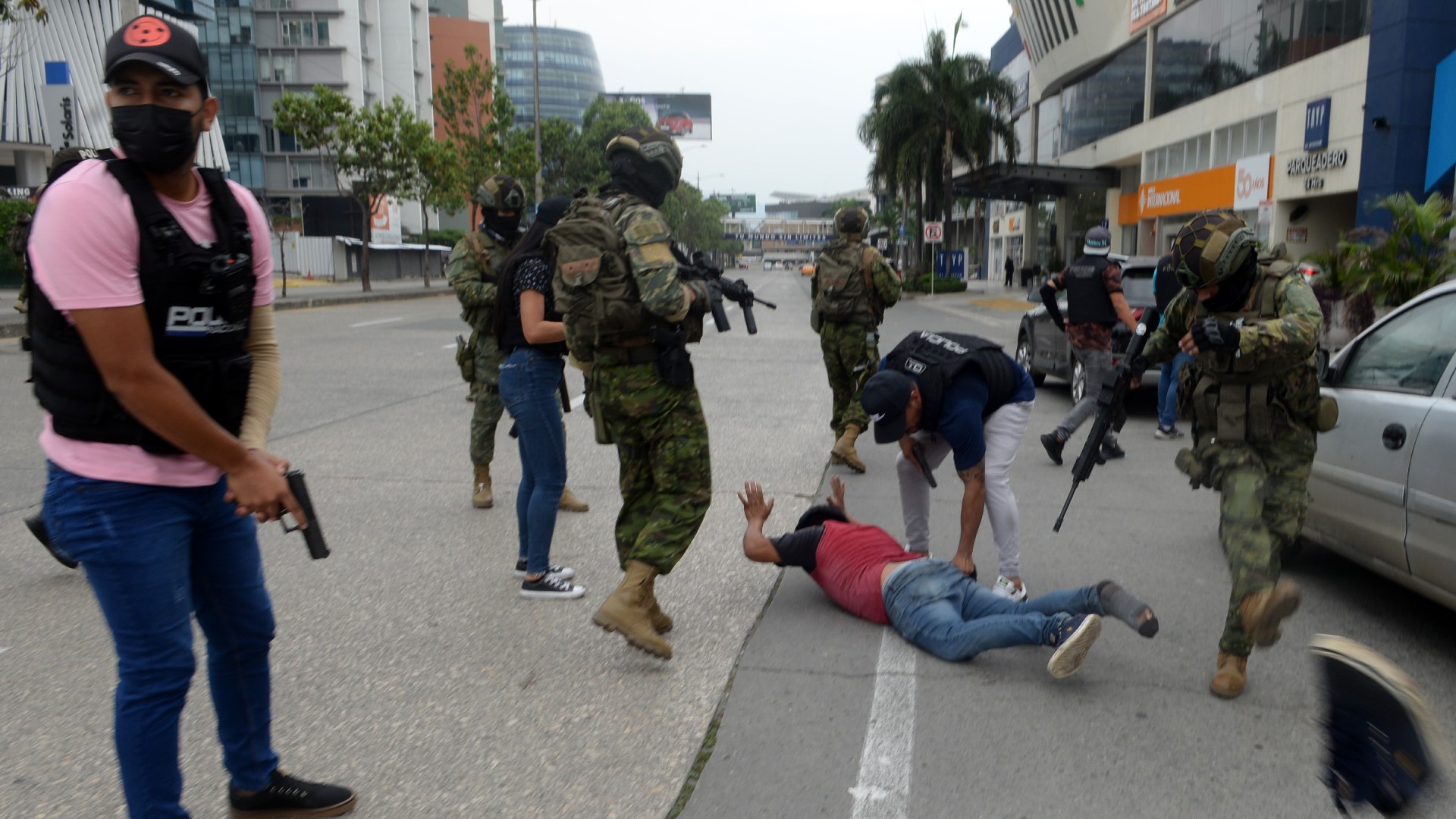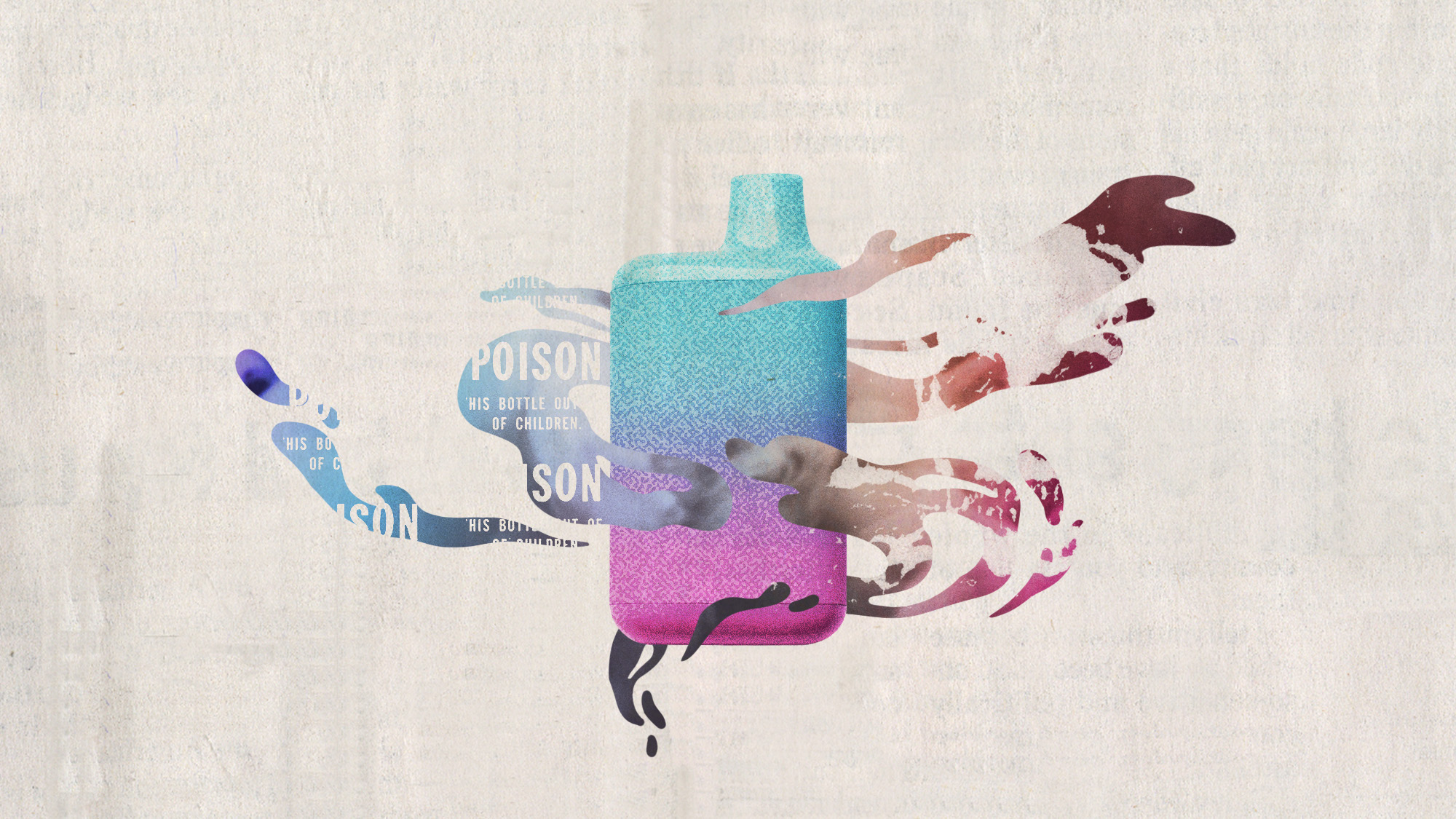Armed gangs, prison breaks and on-air hostages: how Ecuador was plunged into crisis
Gangs launch deadly revenge after president declares state of emergency following escape of feared drug boss from prison

A free daily email with the biggest news stories of the day – and the best features from TheWeek.com
You are now subscribed
Your newsletter sign-up was successful
Ecuador's gangs have unleashed violent war on the government, after the president declared a state of emergency following the escape of the country's most notorious drug trafficker from jail.
Hooded gunmen carrying grenades and dynamite burst into a public TV station yesterday in Guayaquil, the country's economic capital, and forced employees to the floor during a live news broadcast. A woman was heard pleading, "Don't shoot, please don't shoot!", before the signal cut out after 15 minutes.
A cameraman was reportedly shot in the leg, and another's arm was broken, during the attack, following which 13 gunmen were arrested.
The Week
Escape your echo chamber. Get the facts behind the news, plus analysis from multiple perspectives.

Sign up for The Week's Free Newsletters
From our morning news briefing to a weekly Good News Newsletter, get the best of The Week delivered directly to your inbox.
From our morning news briefing to a weekly Good News Newsletter, get the best of The Week delivered directly to your inbox.
The attack is part of a wave of violence that broke out after new President Daniel Noboa declared a two-month state of emergency, following the disappearance of gang lord José Adolfo Macías Villamar from prison.
At least 10 people have been killed in what "appears to represent a declaration of war on the country’s fragile democratic institutions", said The Guardian's First Edition newsletter. Thousands of authorities are still hunting the feared gang boss, while explosions have been reported all over the nation.
Noboa, Ecuador's youngest-ever elected leader, said the country is in a state of "internal armed conflict", which as Sky Newsnoted, allows authorities to "suspend citizens' rights and send the military into prisons".
"Facing an unprecedented test, the president must rise to the challenge or step aside," wrote the editorial board of one of Ecuador’s biggest newspapers, La Hora.
A free daily email with the biggest news stories of the day – and the best features from TheWeek.com
What happened?
Adolfo Macías, better known as Fito, disappeared on Sunday from low-security La Regional prison in the coastal city of Guayaquil. The leader of Los Choneros, one of the country's most powerful gangs, with links to Mexico's feared Sinaloa cartel, he was serving a prison sentence of 34 years, and previously escaped for a few weeks in 2013.
The 44-year-old was scheduled to be transferred to a maximum security prison, but was discovered missing from his cell. Prosecutors have filed charges against two guards as part of their investigation, Sky News reported.
Noboa declared a two-month state of emergency and nationwide curfew, a measure that was widely used by his "beleaguered predecessor" to confront the country's rising violence, said CNN – "to little success", noted Al Jazeera.
The response from the gangs was "unambiguous", Dan Collyns, a Peru-based journalist, told The Guardian. Riots broke out in at least six prisons, with inmates seizing dozens of guards as hostages.
One guard was videoed reading out a message at gunpoint. "You declared war, you will get war," he said. "You declared a state of emergency. We declare police, civilians and soldiers to be the spoils of war."
The gangs are now "collectively fighting the Ecuadorian state", Collyns said.
One of the gunmen at the TV station reportedly said the break-in was the result of people "messing with the mafia".
"Everything has collapsed," the head of news for TC Televisión told The Associated Press. "All I know is that it's time to leave this country, and go very far away."
What is the background?
Ecuador is "living a real nightmare", former president Rafael Correa said in a video shared on X. The situation was "the result of the systematic destruction of the rule of law, of the errors of hatred accumulated over the last seven years", he claimed.
Violence in the "once relatively peaceful" Andean nation has skyrocketed, said the Financial Times, as rival gangs battle for control of the drug trafficking networks. Since 2018, Ecuador's murder rate has increased eightfold, and is among the highest in the region.
The violence "reached new highs" with the assassination of the presidential candidate Fernando Villavicencio last year, said Sky News. Villavicencio, a vocal critic of the gangs, was killed in Quito in the run-up to the August election, days after he said he had received death threats from Fito and Los Choneros.
Noboa won the run-off vote with promises to stem the violence. The former businessman "vowed to retake control of the prisons, which have become both gang headquarters and recruiting centres", said The New York Times.
Last month he pledged to imitate El Salvador's president, Nayib Bukele, and construct two maximum security prisons inspired by the country's notorious CECOT – the biggest jail in the Americas. Since 2022, Bukele has held the Central American nation in an extended state of emergency and thrown large swathes of the male population into prison. The controversial crackdown has sent his approval rating soaring.
But Ecuador's government has blamed the recent surge in prison violence on the president's plan to imitate him, said Al Jazeera.
Harriet Marsden is a senior staff writer and podcast panellist for The Week, covering world news and writing the weekly Global Digest newsletter. Before joining the site in 2023, she was a freelance journalist for seven years, working for The Guardian, The Times and The Independent among others, and regularly appearing on radio shows. In 2021, she was awarded the “journalist-at-large” fellowship by the Local Trust charity, and spent a year travelling independently to some of England’s most deprived areas to write about community activism. She has a master’s in international journalism from City University, and has also worked in Bolivia, Colombia and Spain.
-
 The EU’s war on fast fashion
The EU’s war on fast fashionIn the Spotlight Bloc launches investigation into Shein over sale of weapons and ‘childlike’ sex dolls, alongside efforts to tax e-commerce giants and combat textile waste
-
 How to Get to Heaven from Belfast: a ‘highly entertaining ride’
How to Get to Heaven from Belfast: a ‘highly entertaining ride’The Week Recommends Mystery-comedy from the creator of Derry Girls should be ‘your new binge-watch’
-
 The 8 best TV shows of the 1960s
The 8 best TV shows of the 1960sThe standout shows of this decade take viewers from outer space to the Wild West
-
 Epstein files topple law CEO, roil UK government
Epstein files topple law CEO, roil UK governmentSpeed Read Peter Mandelson, Britain’s former ambassador to the US, is caught up in the scandal
-
 Mexico’s vape ban has led to a cartel-controlled black market
Mexico’s vape ban has led to a cartel-controlled black marketUnder the Radar Cartels have expanded their power over the sale of illicit tobacco
-
 Iran and US prepare to meet after skirmishes
Iran and US prepare to meet after skirmishesSpeed Read The incident comes amid heightened tensions in the Middle East
-
 Israel retrieves final hostage’s body from Gaza
Israel retrieves final hostage’s body from GazaSpeed Read The 24-year-old police officer was killed during the initial Hamas attack
-
 China’s Xi targets top general in growing purge
China’s Xi targets top general in growing purgeSpeed Read Zhang Youxia is being investigated over ‘grave violations’ of the law
-
 Panama and Canada are negotiating over a crucial copper mine
Panama and Canada are negotiating over a crucial copper mineIn the Spotlight Panama is set to make a final decision on the mine this summer
-
 Why Greenland’s natural resources are nearly impossible to mine
Why Greenland’s natural resources are nearly impossible to mineThe Explainer The country’s natural landscape makes the task extremely difficult
-
 Iran cuts internet as protests escalate
Iran cuts internet as protests escalateSpeed Reada Government buildings across the country have been set on fire